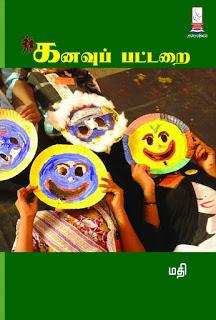
Kannavu Pattarai is a collection of 12 short stories in Tamil language written by Mathi (author’s pen name). The literal translation of Kannavu Pattarai is ‘Dream Workshop’.
Author Mathi describes, in the preface, how beautiful the world of children is. Unfortunately, not many adults understand the subtle child in each of them who loves to play and be free. As a matter of fact, children are not deprived of understanding from the angles of parents, teachers and elders. But it’s the role of a friend in all of these relationships that they are deprived of, in reality. Hence, it’s important for all of us to be that ‘friend’ to little children instead of being just a parent or a teacher.
Thus said, this book though is about children, is intended for adults to understand the world of children.
This review is also posted at my personal blog, Pages from Serendipity.
A quick note: Kannavu Pattarai is a four-day workshop organized by Nalanda Way Foundation* for students from selected schools, mostly at the premises of Dakshin Chitra, Chennai. Author Mathi is one of the two trainers who conducts the workshops and that’s where and when he owes his inspiration behind this book.
(* Nalanda Way Foundation is a non-profit organization which works towards the betterment of children of underprivileged background).
Raja in the first short story, Nerkonda Parvai, is a child down with an inferiority complex. He finds it difficult to look straight into anybody’s eyes, becoming the victim of group mockery by his fellow classmates. His incapability to fight back at his classmates gets expressed by delivering a few abusive words at them and running away quickly. Author Mathi observes Raja’s psyche and behavior during the workshop. He explains why and how children like Raja tend to acquire a complex and how it affects their developing psyche. To begin with, when a child’s request, say for instance requesting a pencil to a parent, is denied repeatedly, a deprived feeling of worthlessness of the self and self-doubt develops. The fear of others disregarding his views makes the child fearful of asking questions in the class, fearful of expressing hunger and eventually, fearful of asking anything to others. Gradually, this state of deprivation and fear comes to a saturation, making the child insensitive to others’ opinions and thus tending to lower his eyelids while facing someone. On the day before the last day of the workshop, Author Mathi interacts with Raja and using a child-centric tactic helps him overcome his inability to look into others’ eyes.
This is an example of how the rest of the stories are organized. Each story deals with one particular psychological trait of a child at the workshop. The author describes his observation of the child, briefs an analysis of the underlying background of it and narrates how he was able to set things right before the end of the workshop.
Every child character the author has chosen is insightful. Readers shall relate them to their self or a sibling or a friend they grew up with or even their children. Through these characters, we shall get a deeper glimpse of what makes a child behave in a certain way. We shall also learn how not to deal with children. Personally, this book helped me to realize how important it is not to lose patience with my little son. Perhaps, I try to be a parent most of the times, focusing on habits and discipline and sometimes miss on the ‘friend’ that he needs from me. I certainly need to change my ways with my son. So shall this book render helpful insights for parents, teachers and elders.
Childhood is precious. As adults, all of us have the responsibility to leave the childhood of children around us healthy. Little changes in our understanding about children can bring big differences in their lives. Kannavu Pattarai is definitely an enriching read to gain this understanding.
Title: Kannavu PattaraiAuthor: MathiPublisher: Aganazhigai PublicationsPages: 156
To buy Kannuvu Pattarai online, please click here (It costs Rs. 160).
You might also want to check Kannavu Pattarai’s Facebook Page.
About the Book
மனித மனம் விசித்திரமானது. கால நீரோட்டத்திற்கேற்ப தன் பாதைகளை மாற்றியமைத்துக் கொள்ள அது சற்றும் தயங்குவதில்லை. ஒரே விஷயத்தில் வளர்ந்தவர்களின் பார்வையும், வளரிளம் பருவத்தினருடைய கருத்தும், எதிர்பார்ப்பும் வெவ்வேறாக இருப்பதன் காரணம் இதுதான். வாழ்வில் வளரிளம் பருவம் முக்கியமானது. அந்தப் பருவத்தில் நம் ஆழ்மனதுள் பதிகிற விஷயங்கள்தான் நம் வாழ்வின் கடைசி வரை நிலைக்கும். வளரிளம் பருவத்தை வார்ப்பதென்பது கத்தி மீது நடப்பதற்கொப்பானது. வலிந்து திணித்துவிட முடியாது. இயல்பாக அதன் போக்கில் சென்று வசப்படுத்த வேண்டும். இதைச் செய்ய பண்பட்ட மனம் வேண்டும். வளர்ந்த நமக்கு அது பெரும்பாலும் இருப்பதில்லை. நம் குழந்தைகளின் மீது கருத்து திணித்தலையும், மன ரீதியான வன்முறையையும் நம்மையறியாமலே வெகு இயல்பாகச் செய்து வருகிறோம். அவர்கள் உலகில் நுழைந்து, அவர்களோடு உரையாடத் தயங்குகிறோம். இதை எப்படிச் செய்வது? செய்தால் வரும் தலைமுறை எப்படியெல்லாம் சிறந்து விளங்கும்? இதைத்தான் இந்தச் சிறுகதைகள் பேசுகின்றன. நன்கு பழகிய நண்பனோடு பேசுகிற தொனியில் சரளமான விவரணையோடு இந்தக் கதைகளை எழுதியிருக்கிறார் மதி. சொல்ல வந்ததைத் தெளிவாகவும், அழுத்தந்திருத்தமாகவும் சொல்லித் தன் கதைகளின் மையப்புள்ளியைத் தொட்டிருக்கும் மதிக்கு இது இரண்டாவது சிறுகதைத் தொகுப்பு.- பொன். வாசுதேவன்
